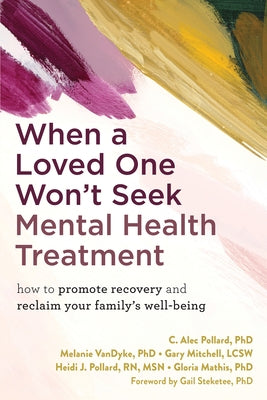Sale 10% Off Your First Order
Sale 10% Off Your First Order
Movies & TV
Toys & Collectibles
- Home
- When a Loved One Won't Seek Mental Health Treatment: How to Promote Recovery and Reclaim Your Family's Well-Being
Description
Escape the "family trap," help your loved one on the road to recovery, and take back your life.
If you have a family member who suffers from mental illness, but refuses to seek treatment, you may feel like you're caught in a trap. If you try making life easier for your loved one, you wind up perpetuating dependency and entitlement. If you push for treatment, you are met with resistance or outright animosity. And when you reach out to professionals for help, you are told that nothing can be done unless your family member is ready to change. So, how can you escape the "family trap?"
Written by clinicians and introducing the innovative family well-being approach (FWBA), this essential guide provides validation and doable strategies for anyone who feels trapped by a family member or loved one suffering from mental illness. Using the skills in this book, you'll learn how your responses to your loved one can worsen and even perpetuate the very problems you are trying to resolve. You'll also discover ways to promote healthy behavior in recovery avoiders, but only after the whole family is emotionally and strategically prepared to follow through successfully.
The family well-being approach outlined in this book is based on established principles of behavior change, family interaction research, and more than three decades of clinical experience. If you're feeling caught in a trap with a loved one who won't seek help--also known as a recovery avoider--this practical guide can help you find your way out, once and for all.
About the Author
C. Alec Pollard, PhD, is founding director of the Center for OCD & Anxiety-Related Disorders at Saint Louis Behavioral Medicine Institute, and professor emeritus of family and community medicine at Saint Louis University School of Medicine. He is a licensed psychologist with a special interest in the study and treatment of individuals with anxiety and emotional disorders who refuse or otherwise fail to benefit from evidence-based treatment. Pollard, codeveloper of the family well-being approach (FWBA), has authored or coauthored more than one hundred publications and leads the Family Consultation Team at Saint Louis Behavioral Medicine Institute.
Melanie VanDyke, PhD, is a licensed psychologist at the US Department of Veterans Affairs, and the Center for OCD & Anxiety-Related Disorders at Saint Louis Behavioral Medicine Institute. She was awarded Missouri Psychologist of the Year (2023) and has authored research articles and educational materials for professionals, patients, and families. VanDyke was principal investigator for the family well-being consultation research project, and is codeveloper of FWBA. Gary Mitchell, LCSW, is a senior staff clinician at the Center for OCD & Anxiety-Related Disorders at Saint Louis Behavioral Medicine Institute. He is a licensed clinical social worker specializing in the treatment of children and adults with obsessive-compulsive disorder (OCD), anxiety disorders, and related problems. He is an original member of the Family Consultation Team at Saint Louis Behavioral Medicine Institute, and codeveloper of FWBA. Heidi J. Pollard, RN, MSN, is currently in private practice where she consults with families dealing with a treatment-reluctant loved one. She was an original member of the Family Consultation Team at Saint Louis Behavioral Medicine Institute, and a codeveloper of FWBA. Gloria Mathis, PhD, is co-owner of the Mid-Atlantic Center for OCD & Anxiety in Columbia, MD. She is a licensed psychologist specializing in OCD, anxiety disorders, and body-focused repetitive behavior (BFRB) disorders in individuals of all ages. While completing her postdoctoral fellowship, Mathis received training in FWBA from the Family Consultation Team at Saint Louis Behavioral Medicine Institute. Foreword writer Gail Steketee, PhD, is a professor and cochair in the department of clinical practice at the Boston University School of Social Work. She is coauthor of Buried in Treasures.Related Products
You May Also Like
Recently Viewed Products
Related Products
Recently viewed products
Shopping cart
close
-
WHAT ARE YOU LOOKING FOR?Search
- Home
- Movies & TV
- Music
- Toys & Collectibles
- Video Games
- Books
- Electronics
- About us
- Castle Chronicles
- Contact us
- Login / Register



